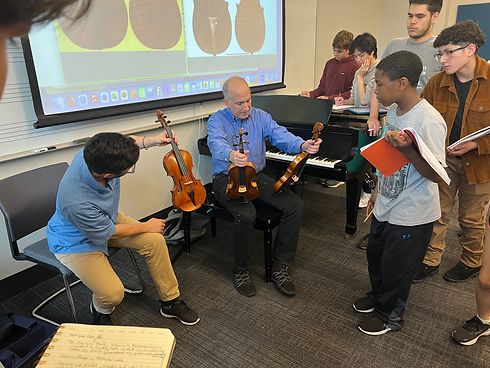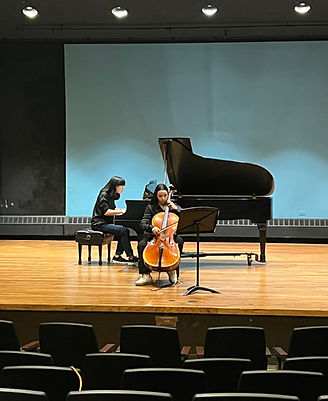FSMA Curriculum

Private Lessons
Each student receives 2 weekly lessons from their teacher. With faculty hailing from Oberlin Conservatory, Manhattan School of Music, University of Utah, Cincinnati Symphony, Lyric Opera of Chicago, Milwaukee Symphony Orchestra, Los Angeles Opera, Grant Park Music Festival, and more, you know that your 4 weeks of study will take you far!


Chamber Music
Students are matched into small chamber groups to gain valuable ensemble experience. Faculty rotate through each ensemble, guiding their rehearsal technique and providing helpful hints.
Orchestra
All students will participate in large ensemble during the full 4 weeks. The ensemble and leadership skills learned through large ensemble settings are key to a musician's education. Pianists will join the orchestra for several pieces.


Piano Ensemble
At FSMA, we focus on collaboration in addition to strong individual playing. In addition to chamber music with strings, pianists will be assigned a piano 4-hands duo to further enhance their ensemble curriculum at FSMA.
Masterclasses
Through audition, students are selected to perform in public masterclasses, either in-person or via Zoom, as well as internal masterclasses. Masterclasses are an integral part of any student’s education. Both those playing and those observing gain new perspectives on technique and musicality, and our Q&A sessions allow students to ask questions about life as a musician.


Zoom Practicing
Practicing is an art unto itself. Faculty monitor all scheduled practice hours during the festival. They help keep students focused and accountable, and are on-hand to address any questions or frustrations that come up in the moment.
Journaling
& Public Speaking
After every practice hour, all students gather with faculty to journal about how their hour went and receive feedback from faculty on how to improve their next hour. At the end of each day, the whole festival meets to talk about general themes that have come up during the journaling sessions: efficiency, self-discipline, self-esteem, motivation, etc. Students benefit from the accountability and camaraderie of a practice community, and faculty can see what areas to target in each student’s lessons.


Performance Classes
Students have regular opportunities to gain valuable performance experience by playing in front of peers and faculty. They not only receive constructive feedback but learn how to give it themselves.
Technique Classes
Group technique classes focus on concepts that apply to all students. Topics include etudes, left-hand placement, bow technique, pedaling, and the historical trends in playing and teaching.


Lecture Classes
We believe that it takes more than playing to make a great artist. FSMA faculty and guests give classes on a range of topics related to their musical experiences: instrument history and maintenance, deep dives into composers, panel discussions about the touring life, Alexander Technique intros, and more.
Essays
We believe it is important to be a strong communicator not only musically but in writing as well. Students write several essays throughout the program. Faculty provide constructive criticism for each one, encouraging students to think more deeply about what they can relate to their own playing even while just observing. For non-native English speakers, this is an invaluable opportunity to practice writing about music, which is not always covered in standard English classes.


Aural Skills
These classes will bring both string and piano students together for a musical experience outside their primary instruments. Through aural skills, students will deepen the connections between music theory concepts and music-making.
Piano Accompanying
Accompanying is an important skill for pianists to learn as they move forward in their pre-professional lives. All piano students will gain experience accompanying their fellow string students, with close guidance from all of our faculty.


Community Performances
We believe in the importance of music in the lives of all. Through weekly auditions, students are selected to perform in outreach concerts for the community. Not only do students gain important performance experience but they also see the joy that their music brings to others.
New: Conducting
FSMA conducting faculty Ryan Tani will be leading our inaugural Conducting program. Students on this track will have one lesson per week on their primary instrument and one conducting lesson per week, and split their practice time accordingly.


Extra:
Pedagogy Institute
Students who are rising college sophomores and above may choose to add on the Pedagogy Institute program, which will take place once per week. These supplemental classes will specifically focus on the history, theory, and practice of teaching. The Pedagogy Institute is open to students who wish to pursue teaching as part of their musical career, or who are interested in the pedagogical process.
Extra:
Orchestral Institute
Students who are rising college sophomores and above may choose to add on the Orchestral Institute program, which will take place two evenings per week. These supplemental classes will specifically focus on the orchestral audition and performance process and be taught by both FSMA and guest orchestral faculty. The Orchestral Institute is open to students who wish to pursue an orchestral career, or who look forward to participating in serious community orchestras throughout their lives.

Each summer's curriculum is subject to change. Please see previous years' schedules for examples.




